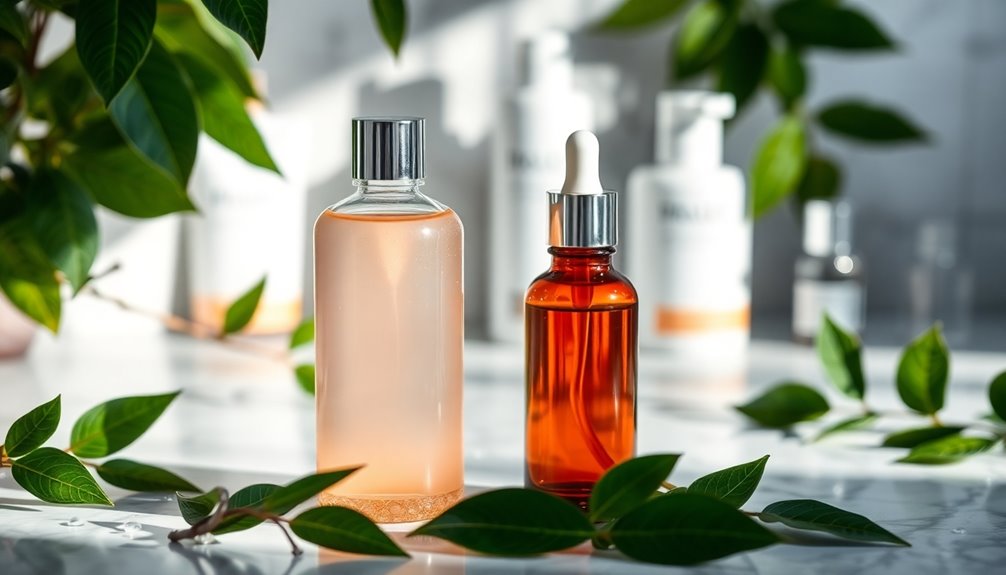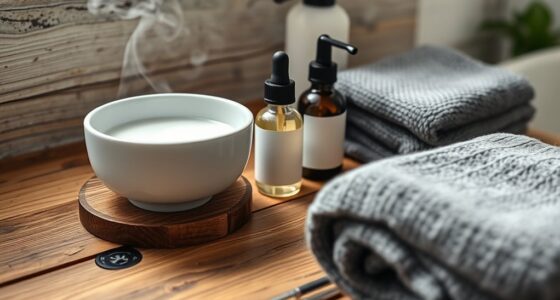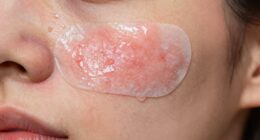Toners are lightweight liquid products applied after cleansing to remove impurities and restore pH balance, while serums are thicker, concentrated formulas targeting specific skin concerns like fine lines or dark spots. Toners help hydrate and prepare your skin, making it more receptive to other products, while serums deliver potent active ingredients for deeper nourishment. Both have unique roles that can greatly benefit your skincare routine. Discover more about how to effectively use each in your regimen.
Key Takeaways
- Toners are liquid products that cleanse and hydrate, while serums are thicker formulations targeting specific skin concerns with concentrated ingredients.
- Toners are applied daily after cleansing, whereas serums are typically used once or twice daily for targeted treatment.
- Toners help minimize large pores and remove impurities, while serums enhance skin texture and address issues like fine lines and dark spots.
- Toners prepare the skin for better serum absorption, making them complementary in a skincare routine.
- Choosing the right toner and serum depends on individual skin type and specific concerns for optimal results.
What Is a Face Toner?
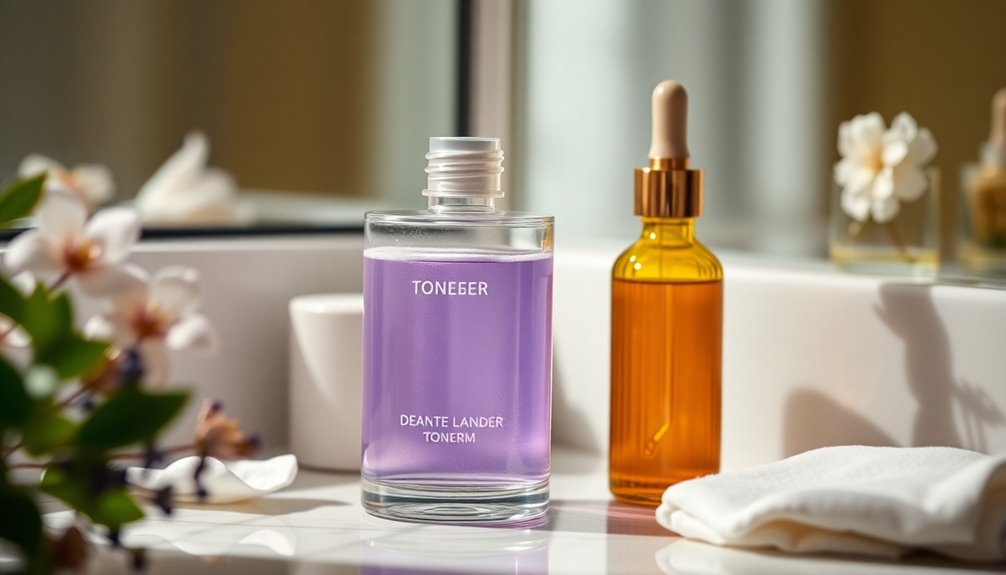
A face toner is an essential liquid skincare product you apply after cleansing to eliminate leftover impurities and help restore your skin's natural pH balance.
A face toner is vital for removing impurities and restoring your skin's natural pH after cleansing.
It's particularly beneficial for those with oily and acne-prone skin, as toners often contain hydrating ingredients like hyaluronic acid and soothing agents such as witch hazel. Additionally, using a toner can complement your sun protection routine by ensuring your skin is well-prepared to absorb broad-spectrum sunscreen for effective sun defense.
By using a face toner, you can effectively remove excess oil and prepare your skin for the next steps in your routine.
Whether you choose to apply it with cotton pads or pat it directly onto your skin, toners can also exfoliate the skin and minimize the appearance of large pores.
Incorporating a toner into both your morning and nightly routines can enhance your overall skincare regimen. Additionally, glycolic acid toners are known for their ability to improve skin brightness and texture.
Benefits of Face Toners
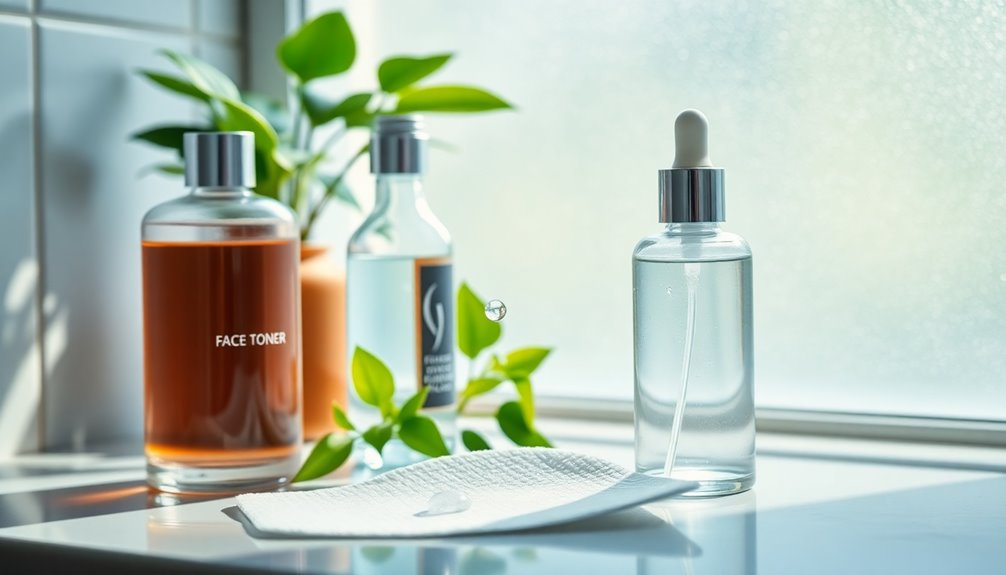
After understanding what face toners are, it's clear that their benefits extend far beyond simple cleansing. Toners play an essential role in your skincare routine, especially if you're dealing with acne-prone skin types. They help by exfoliating dead skin cells and effectively removing excess oil, which prevents clogged pores. Additionally, many toners are packed with hydrating ingredients like hyaluronic acid, ensuring your skin stays moisturized. They also soothe inflammation, minimizing irritation and redness. Incorporating essential oils for skin into your regimen can further enhance your skin's health and appearance. Regular use of toners may also help support skin type balance and promote a clearer complexion.
| Benefit | Description |
|---|---|
| Exfoliation | Removes dead skin cells |
| Clogged Pores Prevention | Keeps pores clear from excess oil and dirt |
| Hydration | Contains hydrating ingredients like hyaluronic acid |
| Soothing | Reduces redness and inflammation |
| Versatile Use | Can be applied throughout the day |
What Is a Face Serum?

A face serum is a lightweight, water-based formula packed with active ingredients targeting specific skin concerns like fine lines and dark spots.
Its smaller molecular size allows it to penetrate deeply, ensuring your skin gets the hydration and nourishment it needs. Additionally, many serums contain ingredients like hyaluronic acid that can boost hydration and improve overall skin texture. Some serums may even include glycolic acid to enhance skin texture and promote cell turnover.
Typically applied after toner and before moisturizer, serums can transform your skincare routine by providing concentrated benefits with just a few drops.
Serum Composition and Texture
Face serums are powerful skincare allies, packed with concentrated active ingredients that work deep within the skin. These products are typically water-based formulations, designed to penetrate effectively and deliver hydration where you need it most. Additionally, serums can be beneficial for individuals following a vegetarian diet as they often seek plant-based sources of essential nutrients for skin health.
The texture of serums can vary considerably, ranging from lightweight and watery to gel-like or even oil-like, ensuring ideal absorption compared to other skincare products. Common active ingredients include hyaluronic acid for hydration, vitamin C for brightening, and retinol for anti-aging benefits.
In your skincare routine, apply serums after toner and before moisturizer to maximize their effectiveness. Due to their concentrated nature, serums often come in smaller bottles and may be pricier than toners, reflecting their specialized formulation and intended results. Additionally, incorporating effective hydration techniques into your routine can enhance the benefits of serums and contribute to overall skin health.
Targeted Skin Concerns
While toners prepare your skin, face serums dive deeper, targeting specific skin concerns like fine lines, dark spots, and uneven texture.
These water-based formulations contain high concentrations of active ingredients that penetrate the skin effectively. Unlike toners, which cleanse and prep, serums deliver potent ingredients for targeted treatment, often yielding quicker results. Regularly incorporating serums can greatly enhance your skin's texture and appearance, making them essential for effectively tackling specific skincare concerns, much like how chia seeds can support digestive health.
Common key ingredients include hyaluronic acid for hydration, vitamin C for brightening, and retinol for anti-aging, each tailored to distinct issues. Additionally, glycolic acid is popular in serums for its ability to promote cell turnover and improve skin texture.
Due to their thinner consistency, you only need a small amount applied directly after using a toner in your skincare regimen.
Application and Frequency
When incorporating serums into your skincare routine, understanding how to apply them correctly and how often to use them is crucial for achieving the best results.
To maximize effectiveness, always apply toner before your serum. After applying toner, gently apply serum to your skin, focusing on specific areas with skincare concerns like dryness or fine lines.
Hydrating serums often contain potent ingredients, so adjust the frequency of serum application based on your skin type and sensitivity—some can be used once or twice daily.
The Difference Between Toner Vs Serum
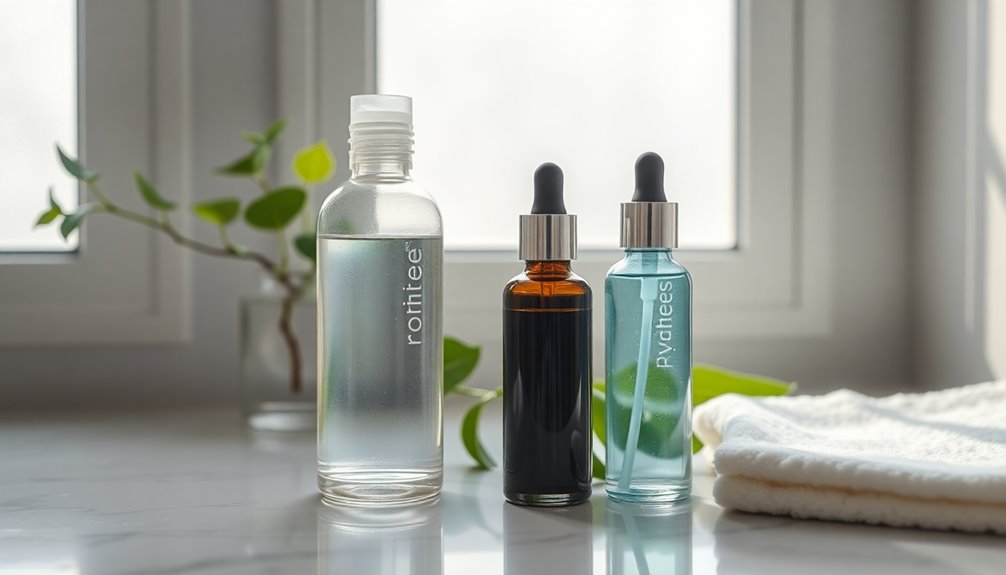
Understanding the difference between toners and serums can greatly enhance your skincare routine. Toners are liquid products that cleanse and refresh your skin, helping to hydrate and restore its pH balance. They're perfect for removing residual impurities and can minimize the appearance of large pores. On the other hand, serums are thicker formulations packed with active ingredients designed to target specific skin concerns like fine lines or dark spots.
| Feature | Toner | Serum |
|---|---|---|
| Consistency | Thinner, liquid | Thicker, concentrated |
| Purpose | Cleanse, hydrate | Target specific concerns |
| Application | Daily, post-cleansing | Once or twice daily |
Incorporating both can elevate your skincare game!
How to Use Toner and Serum
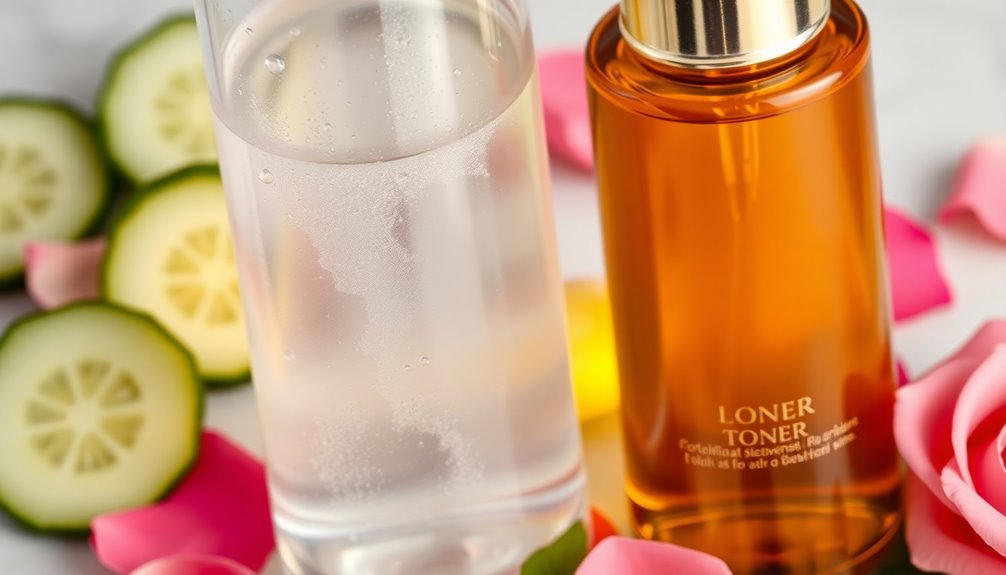
To get the most out of your toner and serum, it's essential to follow the right application order.
Start with a gentle cleanse, apply toner to prep your skin, and then massage in the serum.
This layering technique guarantees that each product works effectively, enhancing your overall skincare routine.
Application Order Importance
Applying toner and serum in the correct order is essential for achieving the best results in your skincare routine.
Always apply toner after cleansing your face, as this helps prepare your skin to absorb the active ingredients in the serum. Use a cotton pad or your hands to apply the toner, allowing it to fully absorb before moving on to the serum.
If your skin feels wet after applying toner, gently pat it dry with a towel.
Once the toner is absorbed, massage the serum onto your skin using your fingertips. Following this with a moisturizer locks in hydration, providing a thorough skincare routine that promotes ideal skin health.
Layering Techniques Explained
After you've established the correct application order for toner and serum, it's time to focus on how to layer these products effectively for maximum benefits.
Start by applying toner immediately after cleansing to remove impurities and restore your skin's pH balance. Use a cotton pad or your hands to apply toner gently, allowing it to absorb fully.
Once the toner has dried, apply serum using your fingertips, concentrating on areas of concern for targeted treatment. Remember to layer the products from thinnest to thickest to guarantee maximum absorption.
If you're using hydrating toners, they can enhance the serum's effectiveness.
Finally, finish your routine with a moisturizer to seal in the benefits of both toners and serums while addressing various skin conditions.
Do I Need Both a Toner and a Serum?
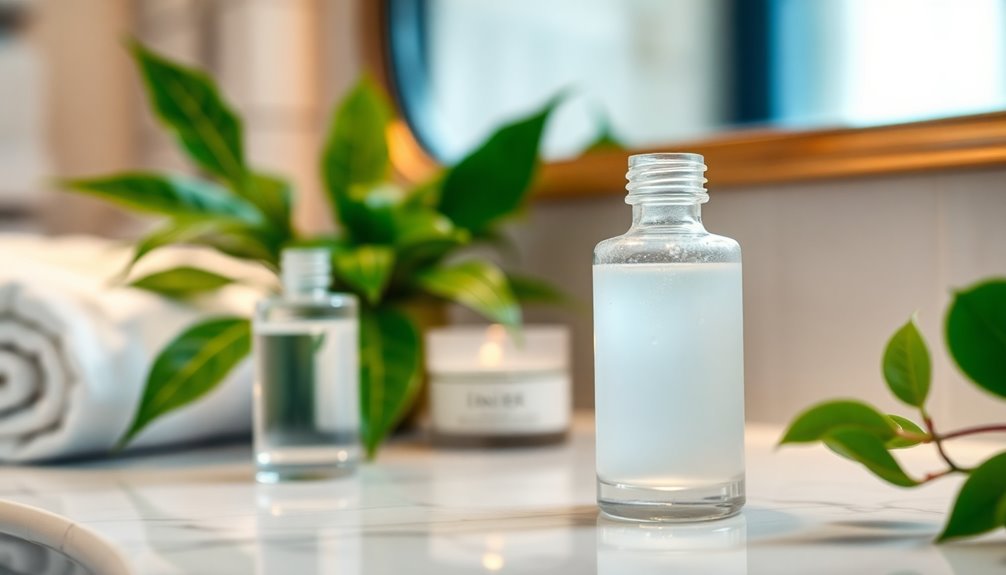
Wondering if you really need both a toner and a serum in your skincare routine? The answer often depends on your individual skin type and concerns.
A toner can enhance hydration and cleanse your skin, especially if you have sensitive skin or are prone to clogged pores. It also prepares your skin for better serum absorption, maximizing the benefits of those active ingredients.
However, if you're using a well-balanced cleanser, you might find that a toner isn't necessary. Ultimately, it's about what works best for you.
If hydration and soothing properties are what you seek, incorporating both a toner and serum may be ideal. Tailor your routine to fit your unique skin needs for the best results.
Finding the Right Toner

How do you choose the right toner for your skin? Start by identifying your skin type.
If you have oily or acne-prone skin, an astringent toner with ingredients like witch hazel can be beneficial.
For dry or sensitive skin, look for hydrating, alcohol-free options that contain soothing ingredients like aloe vera and glycerin for moisture retention.
It's crucial to avoid alcohol in toners, as it can cause excessive dryness or irritation.
Consider formulations with exfoliating acids if your skin needs a little extra help.
Testing different toners will help you find the perfect match that restores your skin's pH balance after cleansing, enhancing your overall skincare routine.
Finding the Right Serum

Choosing the right serum can feel overwhelming, but it doesn't have to be. Focus on your specific skin concern and look for serums packed with active ingredients that deliver results.
Here are three tips to help you find the perfect serum:
- Identify Your Concern: Whether it's hydration, anti-aging, or brightening, choose a serum that targets your specific issue.
- Check the Ingredients: Look for key ingredients like hyaluronic acid for moisture, vitamin C for brightening, and retinol for anti-aging benefits.
- Consider Texture: A lighter, water-based serum is great for oily skin, while a thicker, oil-based serum offers extra hydration for dry skin.
Always follow with a good moisturizer to lock in hydration and maximize your serum's effectiveness.
The Takeaway
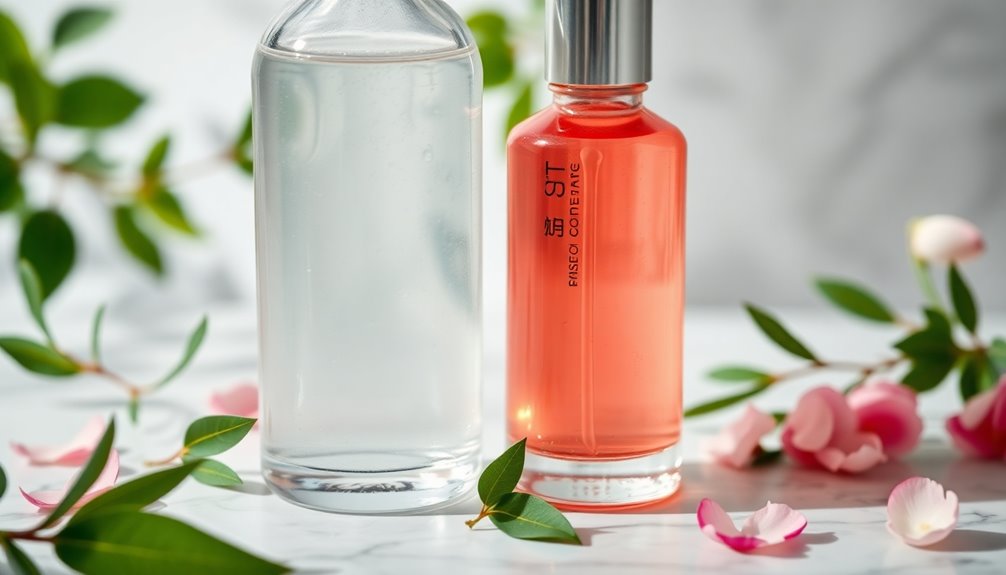
When it comes to building an effective skincare routine, understanding the roles of toners and serums can really enhance your approach.
Toners help cleanse and refresh your skin, restoring pH balance and providing hydration. They often contain ingredients like witch hazel and rose water, making them great for daily use.
On the other hand, serums deliver concentrated ingredients targeting specific skin concerns, like hyaluronic acid for deep hydration or retinol for anti-aging benefits.
Typically, you'd apply toner after cleansing, followed by serum to guarantee maximum absorption. Don't forget to apply moisturizer afterward to lock in that hydration.
Using both toners and serums can lead to healthier skin by addressing both surface-level needs and deeper issues effectively.
Frequently Asked Questions
Is It Better to Use Toner or Serum?
When deciding whether to use toner or serum, it really depends on your skin's needs.
If you're looking for something to balance your skin's pH and give it a revitalizing boost, toner's great.
On the other hand, if you want to target specific issues like aging or hyperpigmentation, serum's your best bet.
Ideally, incorporating both can maximize your skincare routine, allowing your skin to benefit from the unique properties each product offers.
Can I Use Toner and Serum Together?
Did you know that nearly 70% of skincare enthusiasts incorporate both toner and serum into their routines?
Yes, you can definitely use toner and serum together! Start by cleansing your face, then apply toner to balance your skin's pH and remove any leftover impurities.
After the toner absorbs, follow up with your serum to tackle specific concerns. This combo can enhance your skincare, allowing the serum's active ingredients to penetrate deeper for better results.
Is Vitamin C Better as a Serum or Toner?
When deciding if Vitamin C's better as a serum or toner, think about your skin goals.
If you want targeted benefits like brightening and reducing dark spots, a serum's higher concentration will work wonders.
On the other hand, a toner can help balance your skin's pH and provide mild exfoliation.
For the best results, consider using both in your routine; they each offer unique advantages that can enhance your overall skincare regimen.
Are Toners Really Necessary?
"Don't judge a book by its cover."
When it comes to toners, they aren't strictly necessary for everyone, but they can offer benefits.
If you're dealing with oily or acne-prone skin, a toner can help balance your skin's pH and remove leftover impurities.
For those with sensitive skin, a hydrating toner can soothe after shaving.
Ultimately, it's about your skincare goals and what works best for you.
Conclusion
In the world of skincare, toners and serums play distinct yet complementary roles. Think of toners as the revitalizing breeze that preps your skin, while serums are the nourishing rain that delivers targeted benefits. If you're looking to elevate your routine, consider incorporating both. With the right toner and serum, you're not just caring for your skin; you're crafting a radiant masterpiece. So, embrace the journey to luminous skin—your face will thank you!
